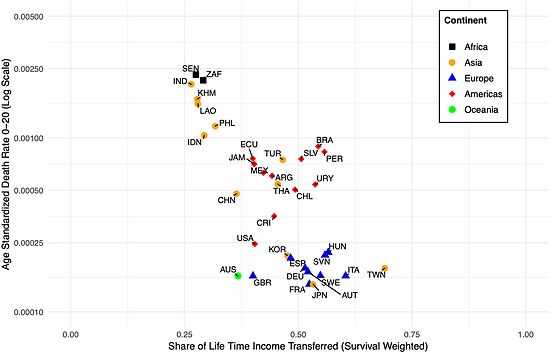Arbeitsbereich
Bevölkerungsdynamik und Nachhaltiges Wohlbefinden
Auf einen Blick
Projekte
Publikationen
Team
Projekt
Die demographischen Konsequenzen von generationenübergreifende Transferleistungen
Ole Hexel, Diego Alburez-Gutierrez, Emilio Zagheni; in Zusammenarbeit mit Fanny Annemarie Kluge (State of Berlin, Deutschland)
Ausführliche Beschreibung
Intergenerational transfers are a fundamental feature of human life that help individuals support themselves in vulnerable phases over the life course. In most societies, children and older individuals cannot finance their needs by themselves, and they require additional resources that more productive members of the society share with the vulnerable age groups. The degree to which resources are reallocated differs across countries and stages of life. In most European and North American societies, we observe private downward transfers to one's own children and grandchildren as well as investments in public education for the young. In contrast to young people, the elderly receive mainly public transfers in the form of pensions and health care. If these schemes do not reallocate sufficient resources to the elderly, they rely on familial exchange. In Asian countries, for example, very large private upward transfers and widespread cohabiting arrangements are observed.
This project has several components. In the first component, we study the effects of mortality and kinship structure on downward transfers. The timing of transfers during the life course of the beneficiary influences their impact; they may help attain certain statuses, such as a university degree, parenthood, or homeownership, more easily or earlier. We combine survey data on household assets with mortality and kinship structure obtained from microsimulations; the goal is to analyze how economic shocks and demographic change interact to constrain the economic opportunities of future generations. This method enables us to go into more detail than do country-level comparisons and, similarly, overcome common limitations resulting from nonresponse and sample size issues in household surveys. We first focus on the USA and the development of race disparities in bequests received over the life course during the past three decades.
In the second component, we investigated how transfers help reduce the risk of dying during vulnerable periods of life. Looking at different continents around the globe, we assessed the transfer generosity and how this relates to health and survival. Transfer generosity is the sum of net transfers redistributed to individuals in dependent ages. The main data source for this analysis came from the National Transfer Accounts Project (a database of age-specific consumption, income, and public and private transfer patterns for more than 90 countries). We have shown that transfer generosity is negatively related to national mortality and positively related to longevity.
In the third component, we looked at the impact of migration on public finances. In light of demographic change, societal discussion highlights the sustainability of public finances especially in European welfare states. This is of importance not only for each EU country but also for the union itself. Given that we have free movement of labor but no social union, demographic fortunes will be reinforced, meaning that young and prosperous regions will attract even more migration from old and disadvantaged regions, thus worsening the latter’s situation. We have shown that Eastern and Southern European countries in the future face high mismatches between taxes and benefits from the combined effects of aging and migration. We also estimated net country contributions in two counterfactual scenarios of a transfer union.
Sterberisiko nach Großzügigkeit des Landes

Das Risiko, in jungen Jahren zu sterben, ist in großzügigeren Ländern geringer (Abb. 2 aus Vogt, Kluge und Lee 2020. Altersstandardisiertes Sterberisiko im Alter von 0 bis 20 Jahren und Anteil des an andere übertragenen Lebenseinkommens). © https://www.pnas.org/doi/full/10.1073/pnas.1920978117
intergenerationelle Beziehungen
Europa, Vereinigte Staaten, Welt
Publikationen
Hexel, O.; Alburez-Gutierrez, D.; Zagheni, E.:
MPIDR Working Paper WP-2024-008. (2024)

Kluge, F. A.; Vogt, T.:
In: Ageing and fiscal challenges across levels of government, 63–76. Paris: OECD Publishing. (2020)

Vogt, T. C.; Kluge, F. A.; Lee, R.:
Proceedings of the National Academy of Sciences of the United States of America 117:37, 22793–22799. (2020)

Kluge, F. A.; Goldstein, J. R.; Vogt, T. C.:
Journal of the Economics of Ageing 13, 45–54. (2019)

Kluge, F. A.:
In: Grünbuch Alternde Gesellschaft: wie das "neue Altern" unser Leben verändern wird, 27–30. München: Max-Planck-Gesellschaft zur Förderung der Wissenschaften e.V. (2017)
